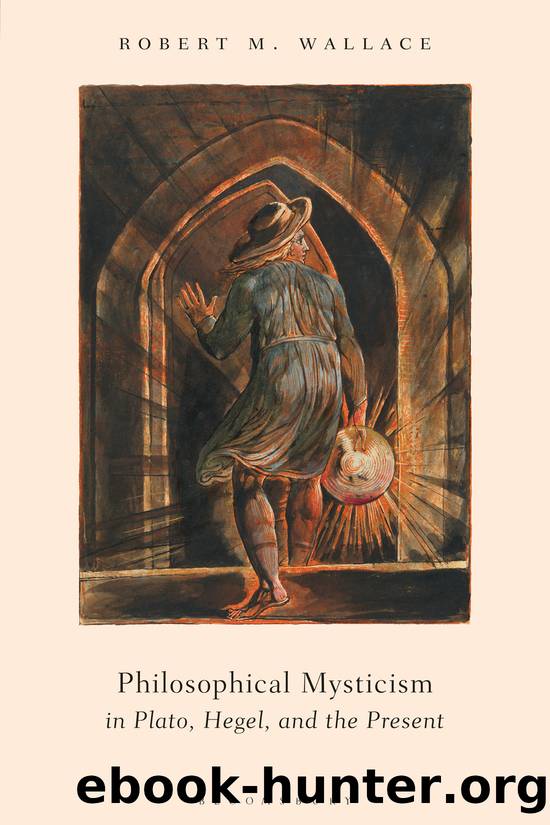Philosophical Mysticism in Plato, Hegel, and the Present by Wallace Robert M.;

Author:Wallace, Robert M.;
Language: eng
Format: epub
Publisher: Bloomsbury Publishing Plc
7 Plato on Reason, Love, and Inspiration
Beauty is truth, truth beauty. . .
John Keats, Ode on a Grecian Urn
ché âl bene, in quanto ben, come sâintende, così accende amore, e tanto maggio quanto più di bontate in sé comprende.
(For good, when understood as such, enkindles love, and more so the more goodness it contains.)
Dante, Divine Comedy, Paradiso xxvi, 28
In this chapter and the next one I aim to do something that may well seem impossible. I aim to reveal philosophyâs heart: to show how philosophy is inseparable from love.
The academic philosophy that many of us have been exposed to seems to have everything to do with the head, and little or nothing to do with the heart. Courses introducing philosophyâs main topics seldom touch on love. The âphilosophy of love and sex,â which has nevertheless come into existence in the last few decades, is a small subspecialty among twenty or thirty subspecialties of Anglo-American philosophy. Of the âgreatâ modern philosophers, only Hegel gives systematic attention to love.1 In the nearly two centuries since Hegel, academic philosophy has been preoccupied with the sciences, and secondarily with ethics and politics and perhaps with the arts or religion. Love, which appears to be peripheral to all of these, has not been a priority.2
This is no doubt part of what the German sociologist Max Weber called the âdisenchantment of the world,â which we have undergone in the age of science. We perceive love as, at most, a personal experience, not as a fundamental reality. So we let literature and psychology deal with it. Shakespeareâs comedies and Jane Austenâs novels speak to us across the centuries because they remind us how the experience of love can transform us and our world. But we think of such transformations as merely âsubjective,â having nothing to do with reality, as such. Danteâs Divine Comedy constructed an entire worldview, a cosmos, around the authorâs experience of love. But no contemporary writer, it seems, could do that. Probably, we suppose, only a Christian believer could do it.
Well, as a matter of fact, a Greek philosopher did it, before Christianity was dreamed of. Love plays such a central role in Platoâs thought that he is sometimes described, in a not too misleading formula, as simply a philosopher of love. And Iâm convinced that Plato was onto something here, which our recent philosophy and culture have neglected to our great loss. Christianity, Dante, and the Romantic poets were right to feel that love is a reality that is at least as deep as the reality that the physical sciences reveal. Hegel was right to seek to vindicate this reality as an aspect of philosophy or systematic knowledge. And Platoâs much earlier treatment of this reality, in his Lysis, Phaedrus, and Symposium, penetrates as deeply into it as any other writing that we have.
Reason, love, and inspiration
Since Plato is also correctly known as an arch-advocate of âreason,â we might well wonder how the same writer can make central two things that seem to have as little to do with each other as reason and love.
Download
This site does not store any files on its server. We only index and link to content provided by other sites. Please contact the content providers to delete copyright contents if any and email us, we'll remove relevant links or contents immediately.
The remains of the day by Kazuo Ishiguro(8969)
Tools of Titans by Timothy Ferriss(8365)
Giovanni's Room by James Baldwin(7325)
The Black Swan by Nassim Nicholas Taleb(7106)
Inner Engineering: A Yogi's Guide to Joy by Sadhguru(6785)
The Way of Zen by Alan W. Watts(6600)
Asking the Right Questions: A Guide to Critical Thinking by M. Neil Browne & Stuart M. Keeley(5757)
The Power of Now: A Guide to Spiritual Enlightenment by Eckhart Tolle(5749)
The Six Wives Of Henry VIII (WOMEN IN HISTORY) by Fraser Antonia(5496)
Astrophysics for People in a Hurry by Neil DeGrasse Tyson(5182)
Housekeeping by Marilynne Robinson(4436)
12 Rules for Life by Jordan B. Peterson(4299)
Double Down (Diary of a Wimpy Kid Book 11) by Jeff Kinney(4261)
Ikigai by Héctor García & Francesc Miralles(4246)
The Ethical Slut by Janet W. Hardy(4242)
Skin in the Game by Nassim Nicholas Taleb(4237)
The Art of Happiness by The Dalai Lama(4125)
Skin in the Game: Hidden Asymmetries in Daily Life by Nassim Nicholas Taleb(3989)
Walking by Henry David Thoreau(3952)
